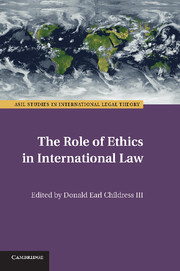Book contents
- Frontmatter
- Contents
- Contributors
- Acknowledgments
- Introduction
- Part one The Role of Ethics in Public International Law
- Part two The Role of Ethics in Private International Law
- 4 The Problem of Provenance: The Proper Place of Ethical Reasoning in the Selection of Applicable Law
- 5 Choice of Law as General Common Law: A Reply to Professor Brilmayer
- 6 A Reply
- 7 The Natural Law Challenge to Choice of Law
- 8 The Role of Ethics in U.S. Private International Law
- Part three Normative and Theoretical Perspectives
- Index
- References
7 - The Natural Law Challenge to Choice of Law
Published online by Cambridge University Press: 05 December 2011
- Frontmatter
- Contents
- Contributors
- Acknowledgments
- Introduction
- Part one The Role of Ethics in Public International Law
- Part two The Role of Ethics in Private International Law
- 4 The Problem of Provenance: The Proper Place of Ethical Reasoning in the Selection of Applicable Law
- 5 Choice of Law as General Common Law: A Reply to Professor Brilmayer
- 6 A Reply
- 7 The Natural Law Challenge to Choice of Law
- 8 The Role of Ethics in U.S. Private International Law
- Part three Normative and Theoretical Perspectives
- Index
- References
Summary
Introduction
This chapter builds on a thought experiment. Imagine a jurisdiction supremely confident that its own municipal law – down to the details of tort law, contract law, and family law – rests on natural law. Why would such a jurisdiction be willing to apply the substantive law of another place in a case involving foreign elements? Why, that is to say, should it give up its own law in favor of a foreign law that in its view is inconsistent with natural law? In a sense, this question is a variation on the puzzle that occupied Brainerd Currie: Why would a forum ever apply foreign law contrary to its own interests? In this thought experiment, however, do not imagine a selfish forum that is looking out for its own welfare or that of its domiciliaries, but a perfectly selfless forum committed to normative justice and legal truth writ large.
A.
Before going further, I should explain why I frame this thought experiment in terms of “natural law” rather than a less loaded notion such as “justice” or “morality.” I do so in part to draw on the long and varied tradition of thinking about natural law, though without importing all the baggage with which that tradition is sometimes associated. More important, though, I use the term “natural law” to capture the distinct combination of two claims that have been at the heart of that tradition at least since the Middle Ages. The first claim is simply normative realism, the view that normative statements can be true. Normative realism, as such, is widely believed even outside the natural law tradition. The second and decisive claim, however, is that there is, in at least some respect, a sort of connection – a hinge or hook – between the normative truths of moral realism, or some of them, and the social phenomenon of law, or some of it. Natural law theories come in a variety of flavors and understand these claims in various ways. I will have more to say about that. Nevertheless, the basic idea of a hinge of some sort between normative truth and law is what gives the thought experiment its particular power.
- Type
- Chapter
- Information
- The Role of Ethics in International Law , pp. 142 - 179Publisher: Cambridge University PressPrint publication year: 2011



